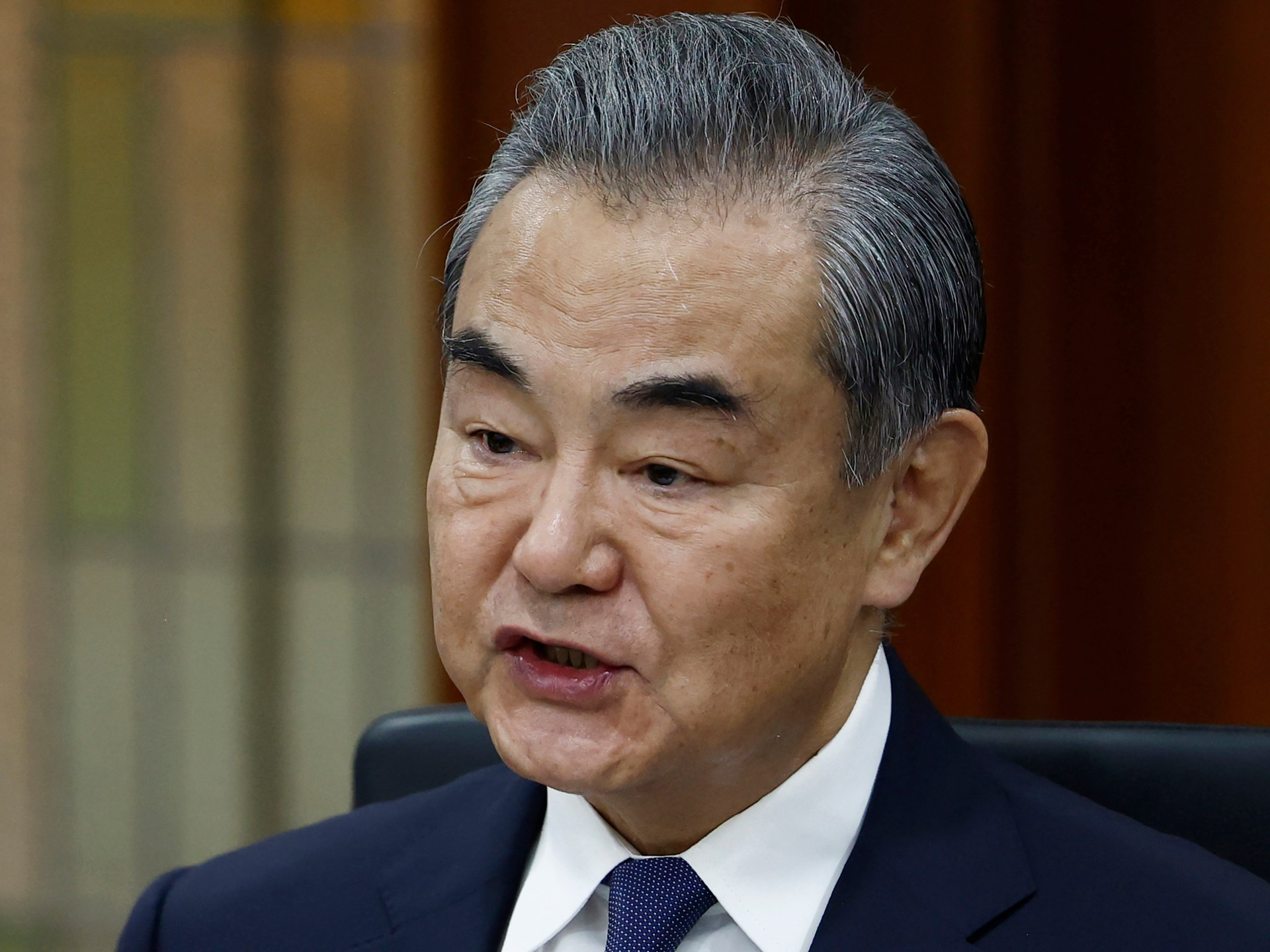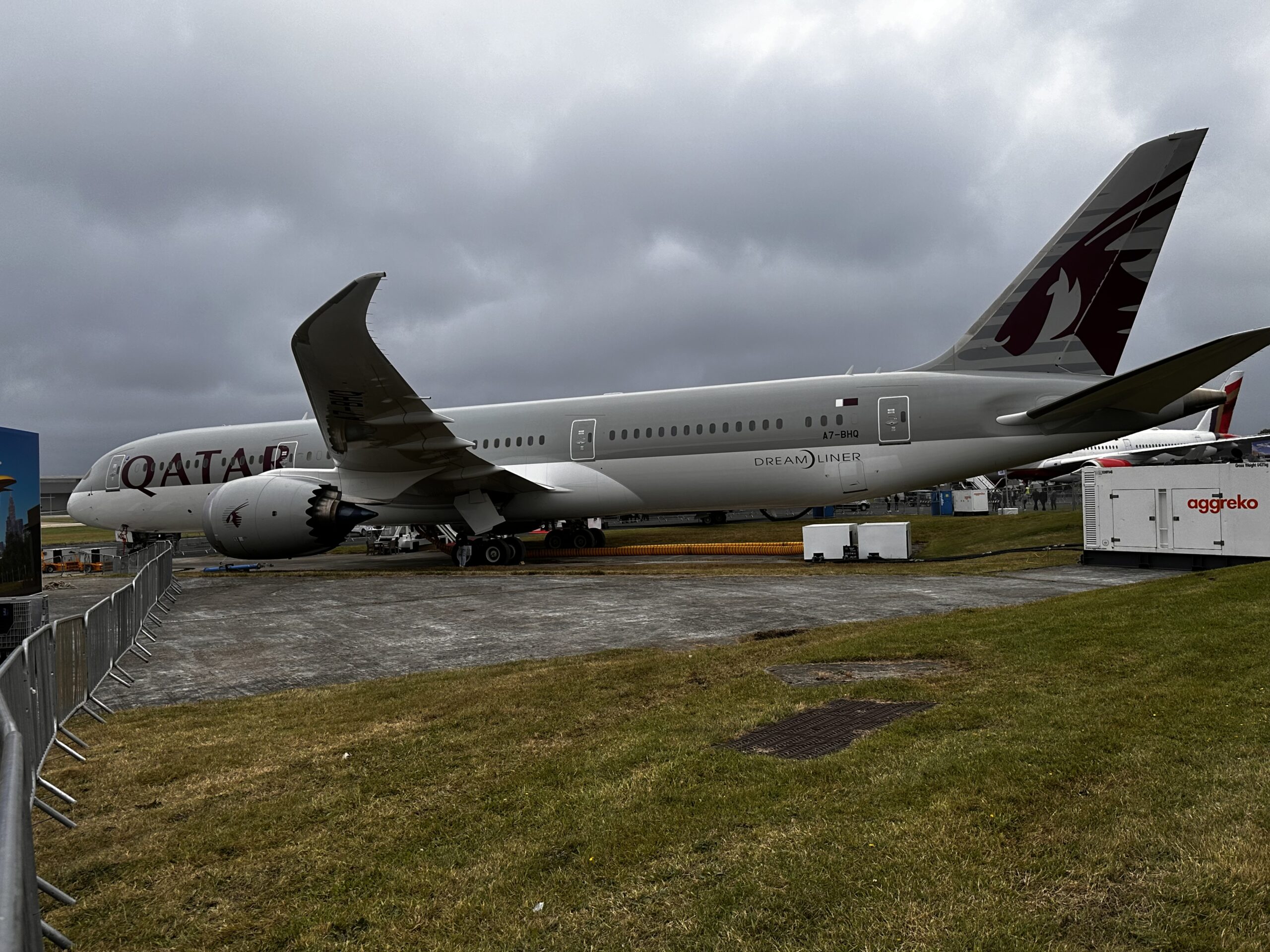‘Create harmony’: Q&A with China’s Foreign Minister Wang Yi

In an interview with Al Jazeera, Chinese Foreign Minister Wang Yi stressed the need to correct what he described as the historical injustice suffered by the Palestinian people.
Underlining that the world needs to take urgent action, he added that China would work with the international community on efforts to implement a ceasefire and secure access to aid.
He also categorically rejected any forced displacement or collective punishment of Palestinians in the Gaza Strip, stressing that peace would be only achieved by attaining justice for the Palestinians and resolving the security concerns of all parties.
Below is the interview with Wang Yi. It has been edited for length and clarity.
Al Jazeera: You have dedicated a significant portion of your last press conference to speak about the war in Gaza. What are the steps that China can take to exert pressure in order to reach an immediate ceasefire?
Wang Yi: The continuation of the conflict in Gaza has led to a humanitarian catastrophe that should not have happened. Over about half a year, the conflict has led to killing and wounding more than 100,000 people as well as the displacement of more than a million.
The international community must act immediately. Achieving a ceasefire and ending hostilities as soon as possible is our top priority at the moment.
Thanks to the joint efforts exerted by all parties, the Security Council has recently adopted the first resolution calling for a ceasefire since the outbreak of the conflict. This is a binding resolution that should be implemented effectively to achieve an immediate, permanent and unconditional ceasefire.
Second, it is necessary to guarantee the arrival of humanitarian aid in a sustainable way and without any obstacles – this is a moral responsibility that cannot be delayed.
Since the beginning of the conflict, China has categorically opposed the forced displacement of Palestinian civilians and the collective punishment of the population of Gaza. We have supported the prompt establishment of a humanitarian relief mechanism and have consistently provided aid to the Gaza Strip.
China will continue collaborating with the international community to mobilise efforts to implement the ceasefire resolution, ensuring the protection of civilians and guaranteeing the prompt, safe, and sustainable delivery of humanitarian aid to the people of Gaza without obstacles.
Third, it is necessary to prevent the conflict from expanding to stop the situation from getting out of control. The recent escalation between Iran and Israel is the most recent manifestation of the potential for the Gaza conflict to expand.
China calls on the concerned parties to maintain restraint to avoid further escalation. We will continue our efforts to support peace and stability in the Middle East and to contribute to de-escalation.
Fourth, it is necessary to correct the historical injustice that the Palestinian people have suffered for a long time. This will represent a radical solution to the conflict in Gaza. The ordeal in Gaza has proven once again that the long-standing denial of the Palestinian people of their legitimate national rights is at the root of the Middle East conflict.
We cannot end the Palestinian-Israeli conflict, uproot the soil that feeds extremist and hateful ideas, and establish permanent peace in the region without bringing about justice for the Palestinian people, really implementing the two-state solution and politically addressing the legitimate security concerns of all parties.
China is keen on continuing its efforts with the international community to enhance cooperation and to continue its firm support of the just cause of the Palestinian people to restore their legitimate national rights.
We will continue our firm support of reconciliation among Palestinian factions through dialogue and support Palestine in its efforts to receive full membership in the United Nations and to establish an independent state where ‘Palestine is ruled by Palestinians’.
We call for the immediate convening of an international peace conference with wider participation and more credibility and effectiveness as well as drawing up a schedule and a roadmap for the implementation of the two-state solution to achieve a just, comprehensive and permanent solution to the Palestinian cause as soon as possible.
Such a solution would lead to peaceful co-existence between Palestine and Israel where the Arab and Jewish nations can live in harmony.
Al Jazeera: How do you see the escalation in the Red Sea, especially as the Chinese Ministry of Defence has announced that it will send naval ships with officers and special forces units on board to escort commercial ships?
Wang: The Red Sea is an international waterway that is important for transport. Maintaining peace, security and safety in the Red Sea contributes to the smooth functioning of international industry and supply chains, which is in the interest of the countries of the region and the international community.
China has expressed its deep concern about the continuous and long-standing escalation of the situation in the Red Sea and its negative repercussions for countries of the region, especially those bordering the Red Sea. China has adopted a very clear position on the Red Sea situation that can be summarised as follows:
First, operations that target civilian ships passing through the Red Sea must be stopped. There is no justification for the targeting of civilians.
Second, the international community must cooperate to ensure the safety of navigation in the Red Sea in accordance with the law. All parties must play a role in de-escalating tensions.
Third, the root cause of the escalation of the situation in the Red Sea is the conflict in Gaza. It is, therefore, necessary to achieve a ceasefire and stop the fighting in Gaza as soon as possible to avoid an expansion of the conflict.
Fourth, the sovereignty and territorial integrity of the countries bordering the Red Sea, including Yemen, must be preserved.
Since the escalation of the situation in the Red Sea, China has maintained contact with all parties and made efforts to calm the tensions. China respects the legitimate demands of countries in the region and is keen on enhancing coordination with them. China continues to work with the international community to play a constructive role in restoring peace, security and safety in the Red Sea as soon as possible.
I should clarify that the escort missions conducted by the Chinese Navy have no connection to the current situation in the Red Sea, they are part of the escort missions in the Gulf of Aden and off the coast of Somalia that were authorised by the Security Council.
Since 2008, the Chinese navy has sent 45 consecutive fleets of more than 150 ships that have successfully completed their missions of expelling pirates and providing humanitarian relief, contributing positively to the preservation of the safety of navigation in the concerned waters.
China will continue to implement the international safety initiative and exert sustained efforts to build a common future for humanity with concrete steps.
Al Jazeera: What is the Chinese position towards the Ukrainian crisis?
Wang: The Chinese position towards the Ukrainian crisis is constant, clear and transparent: China has nothing to do with this conflict, it did not create the crisis, yet it did not watch from afar.
China has been trying, over the past two years, to reach a ceasefire and end the fighting. President Xi Jinping has had deep personal communications with country leaders, including the leaders of Russia and Ukraine, insisting that peace negotiations are the only way out of the crisis and urging all parties to work together to provide favourable conditions to solve the crisis politically through dialogue.
China has also issued a position paper, sent a special representative to the concerned countries several times, undertook shuttle mediation, and sent messages clarifying China’s position and encouraging all parties to find common grounds, overcome differences and reach an agreement.
At the moment, there are still risks of escalation of the crisis, which is why the international community should enhance collaboration and mobilise its efforts to achieve peace and take concrete steps towards calming the situation. We must always insist on a political solution.
No conflict or war ends on the battlefield, but rather at the negotiating table. China supports the convening at an appropriate time of an international peace conference that is acceptable to the Russian and Ukrainian sides with the participation of all parties equally. There, peace plans can be discussed, fairly, to achieve a ceasefire as soon as possible.
We must always insist on an objective and just position, there is no magic wand to solve the crisis. All parties should start with themselves.
They should create favourable conditions to end the fighting and launch peace negotiations after building mutual trust. We must always insist on treating the crisis by addressing its symptoms and causes simultaneously.
Resolving the root of the crisis requires deeper thinking about the security issue. Insisting on unilateral, absolute security and arbitrarily restricting other countries’ security will ultimately lead to imbalance and conflict in the region.
China is willing to work with the international community to uphold the vision that the security of nations is indivisible and support the notion of mutual, integrated, cooperative and sustainable security. The reasonable security concerns of all parties should be respected and a regional security arrangement that is balanced, effective and sustainable should be established.
Al Jazeera: How do you assess the situation in the Taiwan Strait given the close relationship between Taiwan and the US and the continuation of US arms sales to Taiwan?
Wang: Taiwan has always been an indivisible part of China. The Cairo Declaration, which was issued by the governments of China, the United States and the United Kingdom in 1943, states clearly that Taiwan, which Japan had stolen, should be returned to China.
Article 8 of the 1945 Potsdam Declaration which aimed to end World War II stipulates that “the terms of the Cairo Declaration shall be carried out”. UN resolution No. 2758 confirms the One China principle.
These binding international resolutions constitute part of the post-war international order. They have solidified the legal and historical basis of the fact that Taiwan is an indivisible part of China and therefore the Taiwan question is purely an internal Chinese issue.
How it is to be unified with the motherland is an internal issue of the Chinese people on both sides of the Strait. We will exert our utmost efforts with the best intentions to achieve reunification peacefully, but at the same time, our red line is very clear: Not allowing anyone to separate Taiwan from China in any shape or form.
The current situation in the Taiwan Strait is generally stable, but there are dangerous challenges, the biggest of which comes from the separatist activities of the Taiwan independence movement and the acts of interference and sabotage of external powers.
The Taiwan independence movement is the troublemaker and disrupter of stability, the independence of Taiwan must be rejected firmly to maintain peace in the Taiwan Strait. Some countries repeat calls for maintaining peace and stability in the Taiwan Strait, while secretly and rapidly providing separatists with weapons and equipment.
These actions increase the risk of conflict and confrontation and they pose a serious threat to peace and stability in the Taiwan Strait and the region. China will not stand idly by and ignore these actions. No one can underestimate the firm resolve and will as well as the tremendous ability of the Chinese people to defend the nation’s sovereignty and territorial integrity.
President Xi Jinping affirmed that the full reunification of the motherland meets the aspirations of the people and represents an inevitability of history that no power can stop. China will definitely achieve complete reunification and Taiwan will certainly return to the bosom of the homeland.
We are certain that the international community, including countries in the Middle East, will continue to adhere to the One China principle and will support the just cause of the Chinese people to achieve reunification and combat separatist activities calling for the independence of Taiwan.
Al Jazeera: How does China see the US presidential elections and the future of Sino-American relations?
Sino-American relations concern the well-being of the two peoples and the future of humanity and the world
Last November, President Xi Jinping held a successful meeting with his American counterpart, Joe Biden, in San Francisco at the latter’s invitation.
The two reached a future-oriented understanding and the Chinese position on improving Sino-American relations is sincere. Having predictable, sustainable, healthy, and stable relations between China and the United States represents a blessing for the two peoples and the peoples of the world.
At the same time, we have seen that American misunderstanding of China still exists, and its wrong policy of containing China is still ongoing.
The US has recently continued to woo its so-called allies to inflame the situation in regional waters, accelerate the formation of the ‘China containment system’, tighten unilateral sanctions, and impose a technological blockade on China.
The US shouldn’t always look at the world from a Cold War perspective or a zero-sum mentality, and must not always say one thing and do another. The peoples of the world and the peoples of the Middle East are aware of who stands on the right side of history and justice.
What China brings to this world is cooperation, development, stability and mutual gain. There is no force capable of obstructing China’s development and renaissance because of its huge internal dynamism and inevitable historical logic.
The US presidential elections are internal affairs, China has not and will not interfere in the internal affairs of other countries.
The Chinese and American peoples must continue communication and cooperation. China and the United States, as two major countries, must find the right way to deal with each other, regardless of who wins the presidential elections.
The three principles proposed by President Xi Jinping, namely: mutual respect, peaceful coexistence, cooperation and mutual gain are the basis on which we rely in Sino-American relations.
In the recent phone call between President Xi Jinping and President Joe Biden, at the latter’s request, President Xi Jinping once again indicated that two countries as important as China and the United States shouldn’t sever communication and dealings between them and certainly should not go into conflict and confrontation.
They must create harmony and give priority to stability and maintaining credibility.
Sino-American relations will not return to what they were, but they must and can certainly develop towards a better future.
China is ready to work with the US to achieve cooperation based on mutual gain, serving the interests of the world, and effectively assuming its international responsibilities.
Related
Shin Bet chief, captives file head refuse to join talks…
Israeli media reports that the top Israeli officials believe that the discussions will be "pointless" because Netanyahu will soon introduce changes to the deal
Could Qatar Be Getting a Pavilion at the Next Venice…
A Qatar Pavilion could be coming to the Venice Biennale. It would be a rare—and possibly the last—addition to
Farnborough Air Show 2024: A Work of Art: Inside The…
The Qatar Airways Boeing 787-9 Dreamliner was on display at the Farnborough Air Show 2024 this week. It’s a work of art.Qatar Airways Boeing 787-9 Dreamliner
IndiGo will damp lease 6 Boeing 737 MAX aircraft from…
In the world of aviation, one should never say never. And what airline is the current poster boy of being flexible and doing whatever it takes to keep the ne













